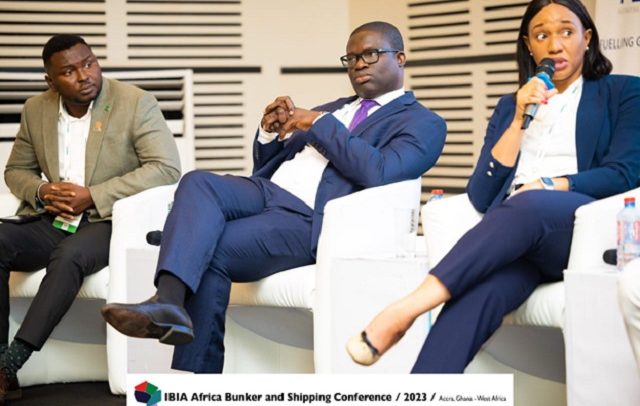Panel discussion session at the conference with Kojo Quainoo, CEO, Amsol Ghana (M)
Industry leaders gathered for the International Bunker Industry Association (IBIA)’s 5th Africa Bunker Shipping Conference, where they underscored the importance of increased collaboration among stakeholders to enhance the bunker trade in Africa.
The three-day event, held from September 5th to 7th at the Labadi Beach Hotel in Accra, brought together key players from Africa and around the world to discuss the latest opportunities and challenges in the bunker and shipping industry.
The conference featured panels covering a wide range of topics, including “Navigating Regulatory Changes: Impacts on African Bunker Market,” “Spotlight on Africa: Adaptation in the Bunker Business,” and “Financing the Marine Industry: Navigating Price Mechanisms for Current and Future Fuels.” Panelists engaged in lively discussions about the need for mutual collaboration between stakeholders and regulators to enhance bunkering trade efficiency in the African market.
Challenges such as complex bunker trade structures, pricing disparities, and licensing issues were highlighted as obstacles facing the industry. However, attendees expressed optimism that these challenges could be mitigated through improved collaboration.
The event garnered support from influential industry players in Africa, including AMSOL Ghana, GOIL Energy, AI Energy Group, and Vivo Energy. With over 20 speakers, the 5th edition not only shed light on the bunkering business in Africa but also addressed specific challenges and opportunities within the industry, along with strategies for growth.

The Chairperson of IBIA, Paul Maclons emphasized the conference’s focus on advancing the industry by fostering effective collaboration, optimizing sector growth in Africa, promoting greater participation by women, and ensuring that the continent keeps pace with international advancements. Of particular concern was the need for African states to embrace technological advancements in the vessel industry, rather than remaining a repository for outdated technology.
Chief Executive of African Marine Solutions (AMSOL) Ghana, Kojo Quainoo, echoed the sentiments of the IBIA Chairperson. He stressed that despite the presence of well-resourced international players, AMSOL has consistently prioritized local content to bolster the country’s economy. Quainoo also highlighted AMSOL Ghana’s commitment to knowledge transfer through the training of local talent.
As a market leader, AMSOL is distinctive as the only marine solutions provider in the region that is both employee and management-owned, contributing to economic empowerment and shared value creation. Quainoo called on the government to address sector-specific challenges while encouraging the maritime industry to focus on training more women to capitalize on the abundant opportunities in shipping and bunkering.
Business Development Manager at AI Energy Group, Theodora Ashare, expressed concerns about regulatory challenges hindering industry growth. She cited bureaucratic bottlenecks faced by regulators attempting to supply fuel to vessels. A share stressed the promising outlook for bunker trading in Africa but emphasized the need for collaborative efforts to devise strategic solutions to overcome these challenges and encourage vessels to purchase fuel in Africa while enhancing sector security.

Head of Technical and Special Products Department at GOIL Energy, John Tagoe, lauded the conference as both important and timely, especially in light of the global push for green energy adoption to reduce carbon emissions and protect the environment. He acknowledged GOIL’s two-decade-long membership with IBIA, highlighting the association’s role in equipping members with technological knowledge, network access, and training opportunities.
The International Bunker Industry Association founded in 1992, serves as an international forum for addressing the concerns of all sectors within the bunker industry. Bunkering encompasses the supply of fuel for ships, including the logistical aspects of loading and distribution among shipboard tanks. IBIA offers practical guidance to its members to navigate industry challenges while actively shaping and influencing both international and local legislation.
In addition to industry stakeholders, the conference attracted government officials from the Ministry of Energy, regulatory agencies, and operators in the bunker and shipping value chain. The conference highlighted the importance of collaboration, innovation, and sustainable practices in driving the growth of Africa’s bunker and shipping industry.
By Ebenezer K. Amponsah & Lucie Blay

